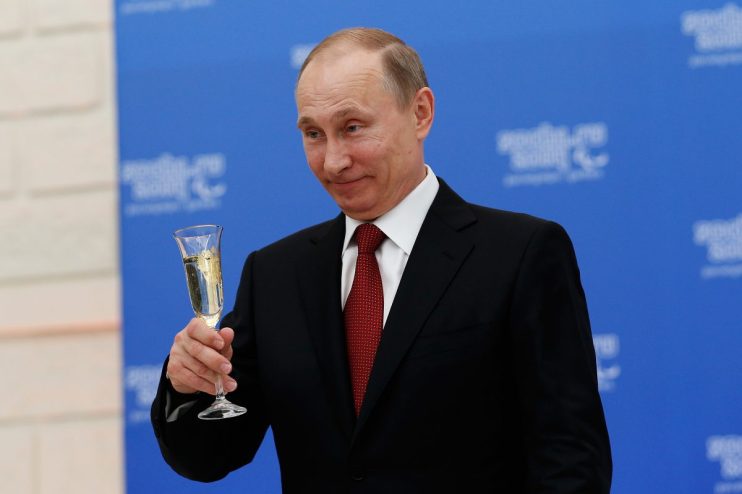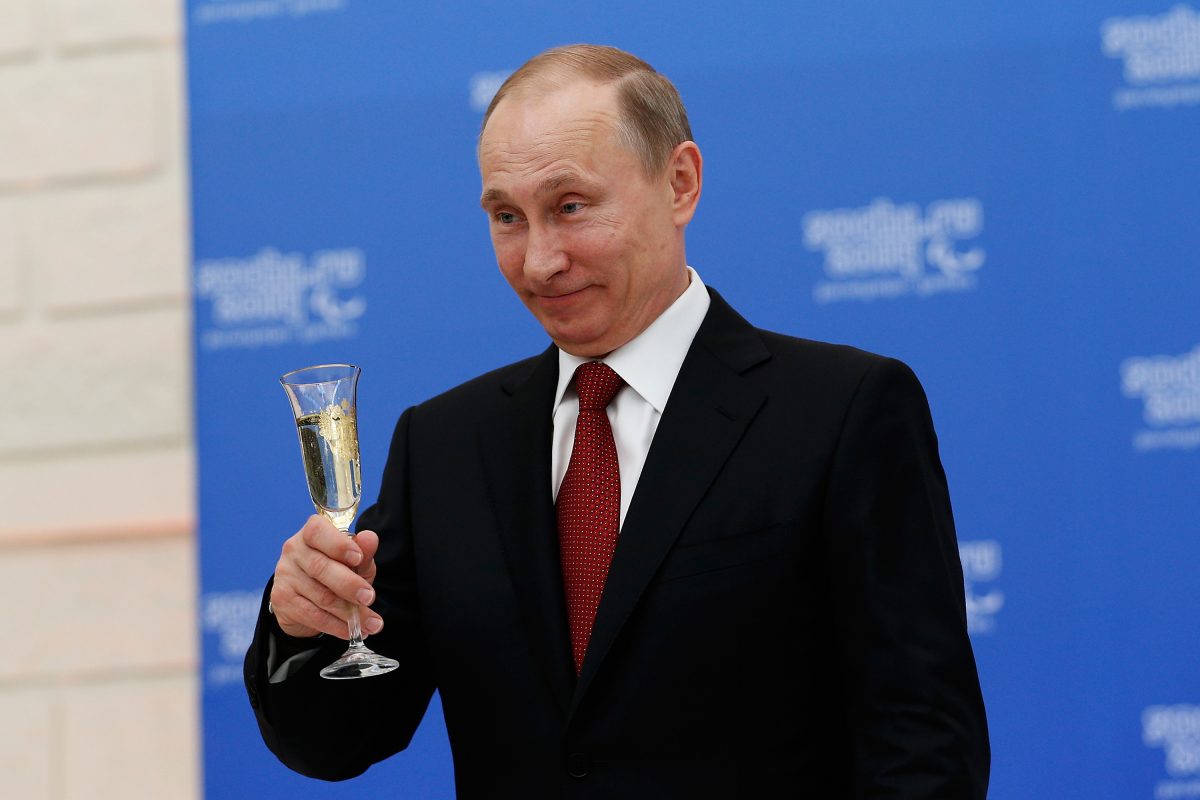Thursday 02 October 2025 7:00 am
| Updated:
Wednesday 01 October 2025 2:43 pm
 Vladimir Putin’s path to Los Angeles 2028 is being cleared as key vote last week goes the way of Russia and Belarus.
Vladimir Putin’s path to Los Angeles 2028 is being cleared as key vote last week goes the way of Russia and Belarus.
Vladimir Putin’s path to Los Angeles 2028 is being cleared, his war on Ukraine becoming normalised in the minds of the world’s sports administrators. Last week’s votes by the International Paralympic Committee to readmit Russia and Belarus are, to my mind, a shameful capitulation and represent a triumph for the warmonger. All eyes now on the IOC and the ultimate prize for Russia’s president – a seat at the Olympic opening ceremony in LA.
It is pointless to speculate as to which IPC member nations tipped the balance in favour of readmitting the two banned countries. The results weren’t even close, placing those like Great Britain in favour of continued suspension in a markedly small minority. The two votes which effectively readmitted Russia scored 111-55 and 91-77 in its favour. Belarus enjoyed even wider levels of support for its return.
There is an irony not lost on those of us who have long been involved in Paralympic sport that the IPC has caved before the IOC on the Ukraine question. After all, the IPC stuck its neck out ahead of the 2016 Games in Rio when it banned the Russian team as a result of the country’s state-sponsored, systemic doping. Thomas Bach, IOC president at the time, made his displeasure clear, just as he did with the IAAF (now World Athletics) which took a similar stance as the IPC and barred Russia from the athletics element of the Olympics.
Russia relations
It took the succession of new IPC president, Andrew Parsons, to heal relationships with the IOC. Russia’s invasion of Ukraine in 2022 effectively buried the rift over the two organisations’ response to the doping scandal. Its act of war effectively breached the Olympic Truce and Russia and Belarus were out (albeit in many sports their athletes were still in, competing under a neutral flag – and provided they could find qualification opportunities).
Qualifying remains an issue for Russian and Belarusian para athletes. The votes at the IPC’s General Assembly do not oblige the federations that rule individual sports to allow them to participate (which is why athletics and the IOC could and did diverge in 2016). It is likely that the resumption of nation status will heap pressure on sports to fall in line, but bans do remain in their own members’ gift.
Furthermore, qualification processes stretch over many months ahead of any Paralympics. Athletes need to build competitive sharpness and secure berths in those tournaments that serve as a route to the Games. The Milano Cortina 2026 Winter Paralympics is just five months away. Russia’s flag may fly there, but its team will likely be tiny and any of its athletes less well prepared than in peace time.
Russia qualifying?
“We urge our European partners, especially Italy as the host nation, not to allow the aggressor’s flag to be raised while the war continues,” Marcy Bidnyi, Ukraine’s minister of youth and sports, said.
The Paras in LA is a different matter entirely, for one crucial reason. The IPC is directly responsible for para athletics and para swimming. In the jargon of the industry, it is itself the international federation for these two sports. Together they provided 39 per cent of the competitors at Paris 2024 taking part in 56 per cent of the medal events. Whatever other sports decide, more than half of the events in 2028 will be open to Russia and Belarus and their athletes have almost three years in which to prepare with access to a full schedule of international events.
A second irony is that the IPC has been conducting a prolonged process to set World Para Athletics and World Para Swimming up as entirely independent entities. Progress has been slow – almost glacial – and it is to Putin’s advantage that his athletes in these two sports do not now face the jeopardy of newly-established governing bodies with fresh leaders whose thinking may diverge from that of the IPC and its voting members.
One argument cited for last week’s decisive votes by the IPC members is Israel’s current actions in Gaza. If Russia is banned, why not Israel too? And why not look to longer-running conflicts, which might strike out China, say?
Russia irony
Over to the IOC’s new head, Kirsty Coventry, with her own Winter Games just four months hence, and an American president to court. Donald Trump may rather enjoy hosting his Russian counterpart at the Los Angeles Memorial Coliseum, striking a marked contrast to the boycotted Games of 1984 in the same city.
“I believe that it is best for our movement to ensure that we have all athletes represented,” Coventry said the day after her election.
Pressure is mounting within football circles for Uefa to ban Israel’s teams, just when Russia appears to be coming in from the cold in Games world. Sport’s reactions to geopolitics are inconsistent and unpredictable. What is clear is that Putin’s coalition of supporting nations spreads widely. Those recent photographs of him with China’s president Xi Jinping likely had a sporting intent as a small but effective part of their wider geopolitical purpose. Nothing like a grandiose show of strength to focus querulous minds.
Note: as always, the above are purely personal views
I follow the Moskva, down to Gorky Park
For those with a conspiratorial mindset and/or a love of classic rock, you might want to check out the 2023 Wind of Change podcast series. Journalist Patrick Radden Keefe pursues a rumour that the iconic Scorpions ballad wasn’t written by the band but by the CIA as part of a Cold War operation.
In 1990, music hacks? In 2025, cyber hacks? The voting for board seats at the IPC last week was beset by technical difficulties. The electronic system had to be replaced by paper ballots. Time dragged and the election wasn’t complete by the time everyone had to head to the airport. One for Jackson Lamb perhaps?
In the eye of the beholder
Can there be anything more beautiful than Ellie Kildunne’s scintillating try for the Red Roses on Saturday, its imagery enhanced by its significance in the contest as she cancelled out Canada’s early lead and settled jangling nerves? Perhaps Shane Lowry’s dance of joy across Bethpage’s 18th green having secured Europe’s retention of the Ryder Cup, nerves in this case not simply jangling but completely shredded?
Such different but equally retina- and memory-searing moments. Proving sport, in any and all of its varieties, can be the most exquisite of art forms.
Ring of Roses
You can spot Kildunne, No15, in the Red Roses’ celebratory post-final circle. A reminder, if any were needed, that this World Cup triumph was an enormous enterprise for England Rugby.
I’ve nothing original to add to the widespread commentary: the final was fantastic, its flowing rugby a treat for the eyes; the crowd was a joy to be among and the atmosphere very different from anything I’ve ever experienced at Twickenham; but of course the hard work to capitalise on the opportunity this has created for women’s rugby lies ahead. Cracking start though!
Channelling Bill Shankly
Back to the Allianz Stadium yesterday for the Leaders Week sports industry conference. Loved this comment from FIFA vice president Victor Montagliani, a Canadian, when pressed by his interviewer on his attitude to Donald Trump ahead of next year’s men’s World Cup: “With all due respect to current world leaders, football is bigger than them.”
Ed Warner is chair of GB Wheelchair Rugby and writes his sport column at sportinc.substack.com

Share
Facebook Share on Facebook
X Share on Twitter
LinkedIn Share on LinkedIn
WhatsApp Share on WhatsApp
Email Share on Email